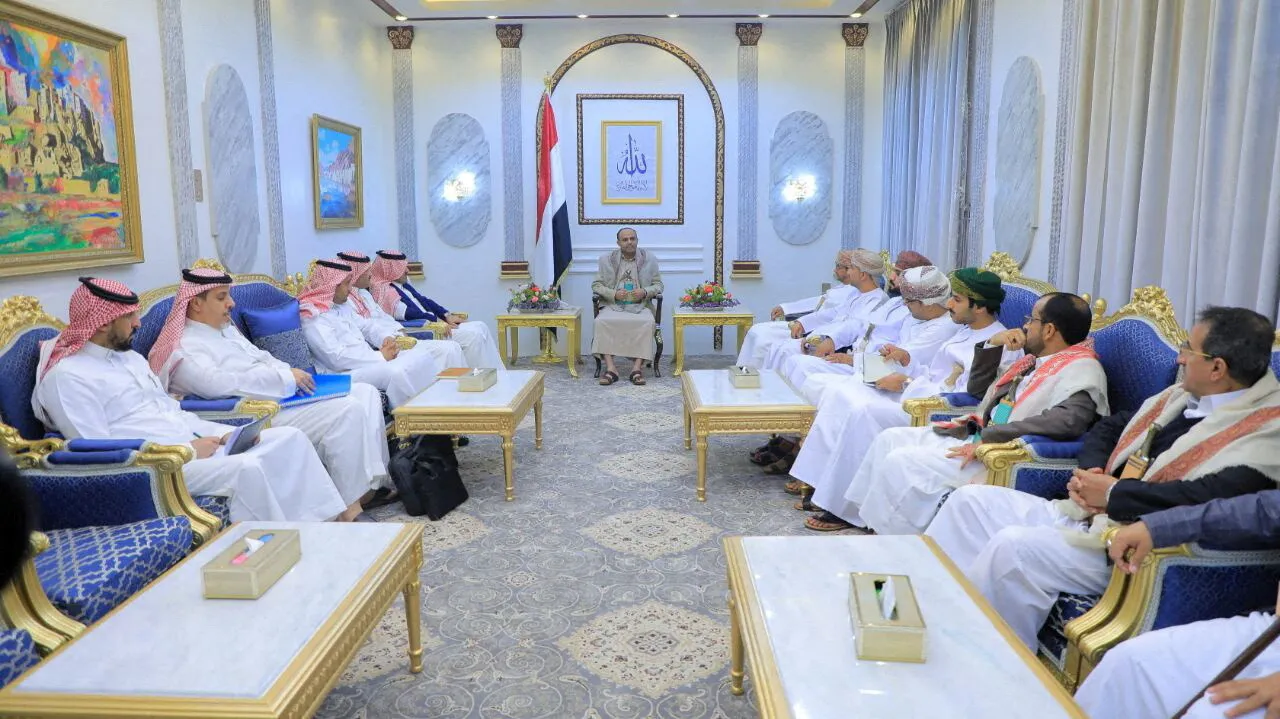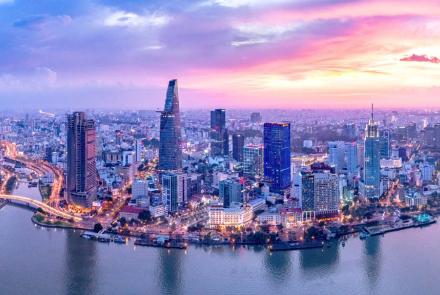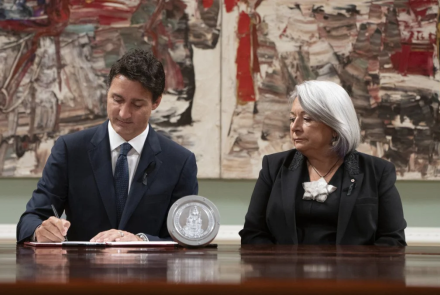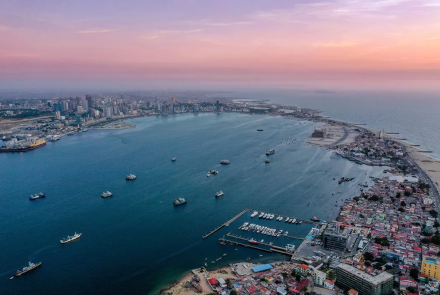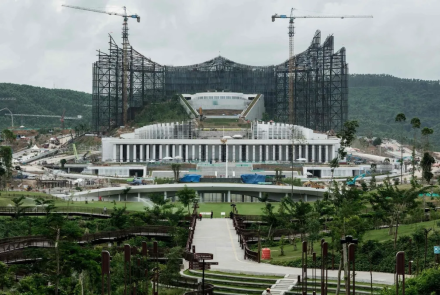Saudi Arabia’s Pivot to Multilateralism : The Beginning of the Multipolar World?
DOMESTIC ECONOMY
Saudi Arabia’s domestic economy has been fostering growth in the following sectors: energy, digitalisation and entertainment. Following changes to the nation’s domestic energy policy and guidelines, development of the nation’s digital economy is leading innovation. Furthermore, a recent trend toward increased support in the nation’s ability to host leading events, the entertainment industry has captured the news. These new trends have resulted in Riyadh becoming a major global centre expanding on their core economic via digitisation and now sports and entertainment.
Firstly, after the tenuous — model of import substitution and export-led growth dominating the 1970s, the Saudi government transitioned its core principles with a unique development strategy based on just pursing state’s natural advantage in oil production and downstream development. Due to a Saudi Arabia’s lasting comparative advantage in petroleum extraction, and infra development in the petrochemical industry, such as the manufacturing of plastics.
Leadership matters. In 2015, King Salman succeeded King Abdullah immediately began to place more focus on the economic welfare of Saudi citizens. Mohammed Bin Salman (Abdullah’s youngest son) assumed the position of Crown Prince in 2017. Since then, the nation has achieved a lowest cost of petroleum industry production, oil and gas that constituted a major natural advantage. Subsequent investments in the downstream development of chemicals, metals and fertilisers have added significant value to the nation’s energy sector. This development has potentially resulted in Saudi Arabia becoming a major industrial power, whilst maintaining a fundamental link to hydrocarbons and generating revenue to invest into other sectors of the economy, strengthening their comparative advantages through sovereign investment.
Special Economic Zones, on April 13th 2023, Mohammed Bin Salman, launched four special economic zones in four cities: Riyadh, Jazan, Ras al-Khair and King Abdullah Economic City. Companies operating in any of the four zones can expect to receive many benefits (e.g., competitive corporate tax rates, exemption from customs duties on imports, production inputs, machinery and raw materials, and flexibility to hire the qualified talent from anywhere in the world). The aim of this initiative, is to promote Saudi Arabia as an ideal location for foreign direct investment as part of the nation’s 2030 vision goals.
Digitization. Saudi Arabia is fast becoming a global leader in digitalisation, as this sector can help increase investment in the digital economy, not only among the Gulf Cooperation Council nations, but in the wider Middle East and North Africa region. Moreover, the Saudi Digital Government Authority (D.G.A.), have recently collaborated with the World Bank and the O.E.C.D. to develop and publish a framework for best digital practices. In the Saudi Arabia Legal and Regulatory Framework for Digital Government, the stated goal of the framework is to help Saudi Arabia achieve digital maturity. It analyses policies for effective design and strategic approaches to digitisation. It is already being used as a reference for other countries who are beginning to implement their own digital economic policies.
Media & Entertainment. In relation to a growing cultural segment of the economy, Saudi Arabia recently launched the LIV Golf Series (financed by the Saudi public investment fund) and becoming a sole host to boxing matches. The 2023 LIV Golf Series, will feature 48 players and 12 established team franchises, all competing in an expanded 14-tournament schedule, all competing for the $405m cash prize. This is a large increase from the $225m prize from the previous 2022 season. All venues will be located in Mexico, the USA, Australia, Singapore, Spain, United Kingdom and Saudi Arabia. This event runs from February to November. This golf tour has attracted many professionals such as Sergio Garcia (Spain), Dustin Johnson (U.S.A.), Lee Westwood (U.K.), Louis Oosthuizen (South Africa), allowing golf players to earn additional revenue from sponsorships and partnerships.
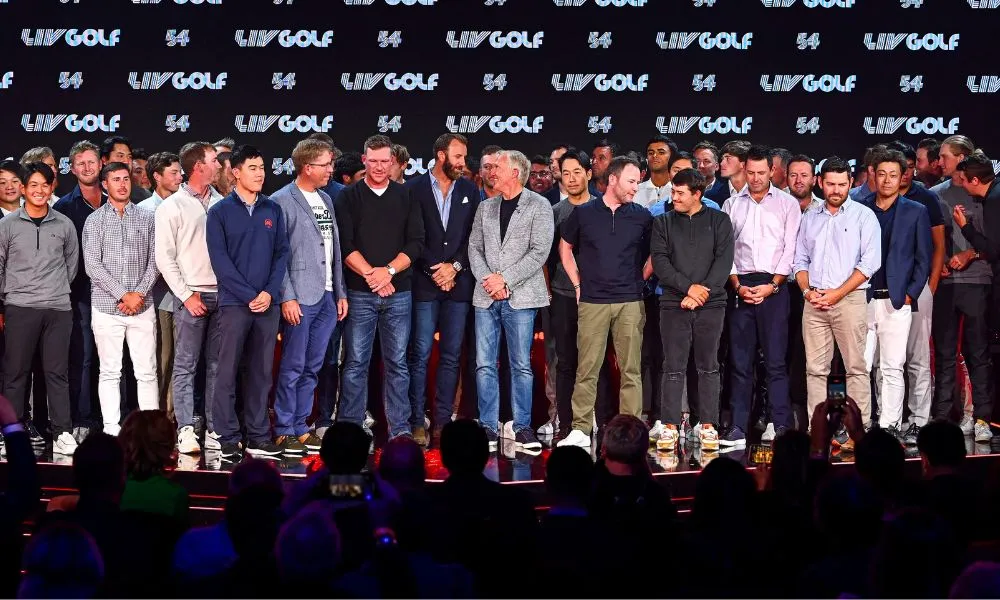
Live Golf Press Conference (2022)
In addition, and almost unprecedented Saudi Arabia recently hosted a boxing match featuring renown British reality TV star Tommy Fury and American YouTuber Jake Paul on February 26th 2023. After 8 rounds, Fury emerged victorious over Paul based on a split decision on knockout points. This boxing spectacle was intended to boost Saudi Arabia’s reputation as a top-flight boxing destination, generating millions in revenue and 775,000 PPV sales. Several former and current boxing world champions attended this match, including Mike Tyson, Deontay Wilder, Devin Haney and Tyson Fury (brother of Tommy Fury). Other famous individuals in the audience was Hollywood comedian Kevin Hart and five-time ballon d’or winner Cristiano Ronaldo, who recently signed for Saudi football club Al Nassr.
INTERNATIONAL TRADE
In the case of the Saudi Arabia’s free trade policy, the nation has actively been increasing bilateral relations with members from the B.R.I.C.S and S.C.O. Also, trade in goods and services represented 59% of Saudi Arabia’s G.D.P. in 2021 according to the world bank (figure 1).
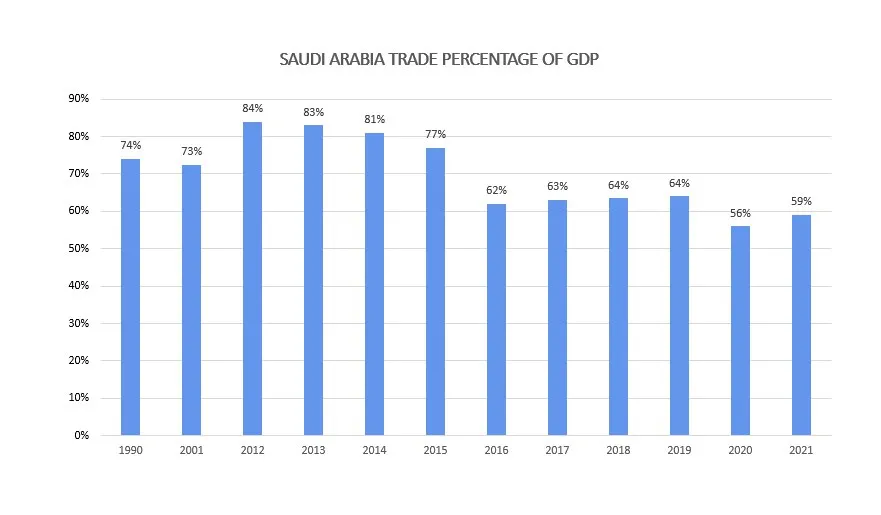
Figure 1 (World Bank, 2021)
BRICS Application. Towards the end of 2022, during the state visit of the South African president Cyril Ramaphosa in Riyadh, the prime minister of Saudi Arabia, Mohammed Bin Salman formally expressed the country’s interest in joining BRICS. The B.R.I.C.S. (Brazil, Russia, India, China and South Africa), group of nations founded in 2011, recently contributed 31.5% of global G.D.P. growth and is expected to achieve 50% of global G.D.P. growth by 2050 (figure 2).
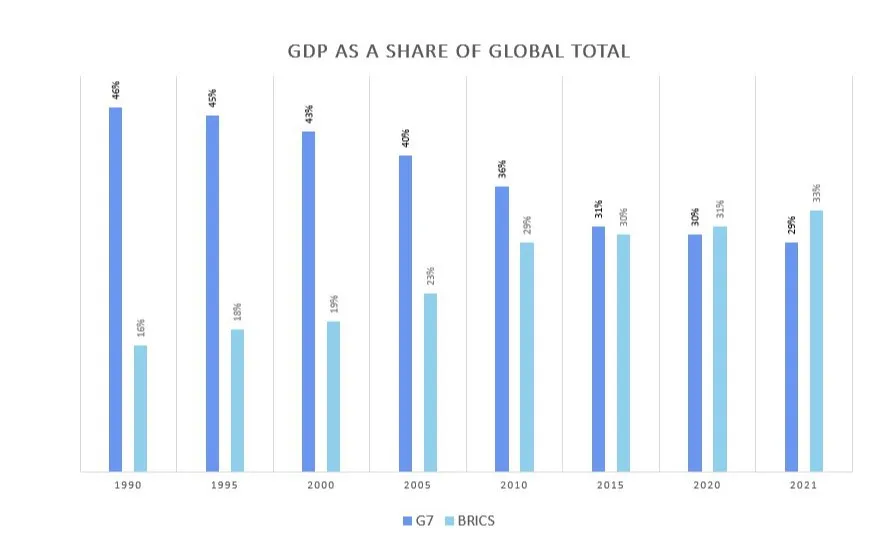
Figure 2
Moreover, in March 2023, the Saudi national cabinet votes to join the Shanghai Cooperation Organisation (S.C.O.) as a dialogue partner. The Shanghai Cooperation Organisation founded in 2001, is a regional political, economic, security and defence organisation. This group consists of 8 members (China, Russia, India, Pakistan, Kazakhstan, Uzbekistan, Tajikistan, Kyrgyzstan).
O&G Production Cuts. in October 2022, OPEC+ had agreed to an output cut of 2 million bpd from November until the end of the year, a move which disappointed the U.S. and other nations as tighter supply boosts oil prices. Moreover, on April 2nd 2023, Saudi Arabia along with other key members of OPEC+ announced they plan to make further cuts to oil production (figure 3). More than 1.6 million b/d of voluntary supply cuts in total, with the bulk of these reductions starting in May and lasting until the end of the year.
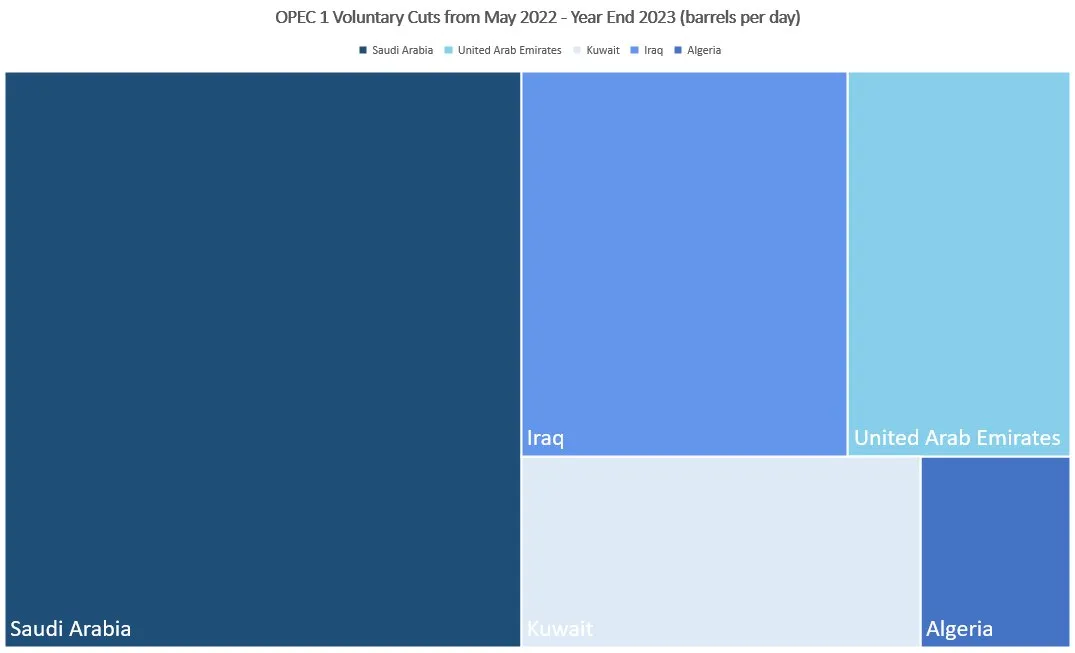
Figure 3
International Partnerships. On December 9th 2022, the leaders of Saudi Arabia and China reaffirmed their cooperation on global oil markets and the principle of non-interference in each other’s internal affairs in Riyadh. This summit marked the strengthening of diplomatic ties between the two nations regarding energy, defence and technology. Later on that day, president Xi met other Gulf oil producers and attended a wider summit with Arab League countries, informing them that China would continue to import large quantities of oil from the region as well as increase its imports of liquefied natural gas. He called for the use of the yuan in settling oil and gas trade transactions.
This highlights the ever increasing trend of the yuan being more actively used abroad, as other major OPEC+ nations and BRICS members are either accepting yuan already or strongly considering it. For instance, Russia, Iran and Venezuela account for about 40% of the world’s proven oilfields, and the three states sell their oil in exchange for yuan. They sell it at a sharp discount to Western market levels. Furthermore, on April 26th 2023, for the first time ever, the yuan became the most widely-used currency for Chinese cross-border transactions, overtaking the U.S. dollar. The yuan’s use in cross-border payments and receipts rose to 48.4% at the end of March, whilst the dollar’s share decreased to 46.7% (figure 4), according to a Reuters calculation of data provided by China’s State Administration of Foreign Exchange.
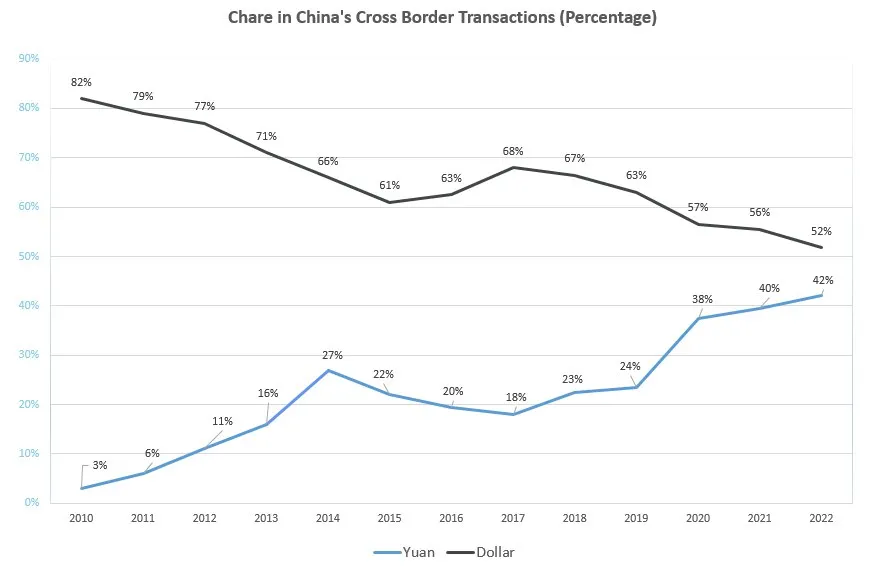
Figure 4
Moreover, other areas for closer cooperation listed by the Chinese leader were “clean and low-carbon technologies focusing on hydrogen, energy storage, wind and photovoltaic power and smart power grids, as well as localised production of new energy equipment,” and development of a civilian nuclear programme. In addition, Xi mentioned the Shanghai Futures Exchange being “fully utilised” is a recognition that if the Gulf states are to use a currency other than dollars in oil transactions, they will require elaborate hedging tools. Cooperation between sovereign wealth funds and other forms of investment were key parts of the talks.
LEADERSHIP
Saudi Arabia’s recent agreement with Iran to re-establish diplomatic ties is based on the Kingdom’s renewed policy of choosing political solutions and dialogue to settle disputes. This is highlighting the new approach of Saudi Arabia’s foreign policy regionally, as the nation is actively wanting to resume diplomatic ties with not only Iran, but Syria and Yemen as well.
Mending of Ties. Regarding the new deal, between Iran and Saudi Arabia, the two nations have committed to reopening their embassies and missions later this year and implementing security and economic cooperation agreements signed over 20 years ago. Second, on April 14th 2023, ministers and top officials from six Gulf Cooperation Council (GCC) countries — Bahrain, Kuwait, Oman, Qatar, Saudi Arabia, United Arab Emirates, Egypt, Iraq, and Jordan arrived at the meeting.
Saudi Arabia, which has long resisted normalisation with al-Assad, said after a rapprochement with Iran (Syria’s key regional ally), a new approach was required to resume relations with Damascus. Moreover, on April 18th 2023, Syrian President Bashar al-Assad met with Saudi Foreign Minister — Prince Faisal bin Farhan Al Saud in the most significant step yet towards ending Syria’s decade-long regional isolation.
Peace Summit. an exchange of nearly 900 prisoners from Yemen’s civil war between the Iran-backed Houthi rebels and a Saudi-led coalition commenced, when the first flight left the rebel-controlled capital, Sanaa. Following a breakthrough in talks between Saudi Arabia and Yemen, a draft agreement presented to the Yemeni government, consists of a ceasefire for a period of six months in a first phase to build confidence, and then a period of negotiation for three months on how best to navigate the transitional phase, which will last for two years, during which a final solution will be negotiated between all parties.
In addition, public employees in areas under Houthi control will be paid with oil and gas revenues from government-controlled fields, a longstanding Houthi demand. Blockades on ports will be lifted and goods will be allowed into Aden without first going to Saudi Arabia.
Critique:
Based on the three topics covered in relation to Saudi Arabia’s domestic economy, international trade and leadership, the recent trends covered reveals how Saudi Arabia is pursuing multilateral policy. First, the government is aiming to transition away from the heavy reliance on hydrocarbons, marking a shift from comparative advantage specialisation into developing other sectors of the nation such as its digital economy and entertainment. Especially, as the state is actively playing a key role in the nation’s development.
Second, the nation is increasing its trading relations with member states of the B.R.I.C.S. and S.C.O., which can help secure diversified sources of foreign direct investment into the nation. By applying to join both organisations, the change in the nation’s domestic economic development and foreign policies are becoming more similar to members states in both organisations. As each member state policies are actively attempting to influence the management of markets and corporations. However, these new state capitalisms are quite unlike those of previous development policies. They are employing new tools, such as sovereign wealth funds and private-public partnerships. Most importantly, these new state capitalisms display considerable awareness of the benefits of market competition and international economic integration (neo-statism). In comparison to the failures of neo-liberal policies implemented in other developing nations and moving beyond comparative advantage specialisation.
Lastly, in the case of leadership, as Saudi Arabia is resolving diplomatic disputes with its regional neighbours, these actions increase stability in the region, which is necessary to attract foreign investment and following its applications to join B.R.I.C.S. and S.C.O., its neighbours have now also applied to join both organisations. Thus, as Saudi Arabia continues to pursue multilateralism, Riyadh will continue to become a major global hub of economic and political interest going forward.


